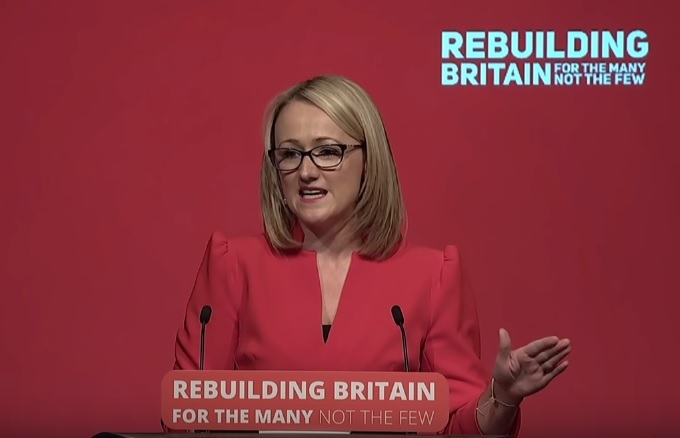A Labour government would take the UK’s offshore wind capacity to 52GW within the next 10 years and invest billions in EV charging infrastructure, the party has said.
Ahead of shadow energy secretary Rebecca Long Bailey’s speech at the party’s conference today, the party unveiled a raft of clean energy pledges designed at ramping up the country’s renewables portfolio and enabling a widespread adoption of electric vehicles.
The pledges feed into previously-announced plans to overhaul the UK’s power system, starting with the “immediate” renationalisation of transmission and distribution grids.
The plans also feed into a wider policy agenda, spoken of by Labour deputy leader John McDonnell yesterday, focusing on a UK equivalent of the Green New Deal to tackle climate change, which McDonnell described as the primary political question of today.
Offshore wind and a People’s Power Plan
Labour has pledged to create a ‘People’s Power Plan’, wherein the government will take a 51% stake in as many as 37 new offshore wind farms, to be built in the UK. Those offshore wind farms would swell the country’s offshore wind capacity to 52GW by 2030, marking a significant contribution towards renewable output.
It said the intent for the public to own a majority stake in new developments was designed to prevent private and foreign public firms dominating deployment of offshore wind as they are now. Last week’s offshore wind CfD results, wherein the asset class clinched record low strike prices of £39.65/MWh, saw the third round principally won by companies including SSE, Equinor, Innogy and Statkraft.
Speaking at the conference today, Long Bailey also said that the country could not “rely on the market to act fast enough”.
Labour has also committed that 80% of all profit generated from the public’s stake in new offshore wind would be redirected to new renewable generation, wider energy system improvements and to aid the “climate transition”.
Labour has yet to provide any further information as to what technologies or scales would be supported under the fund, however the party has previously stated an ambition to support the deployment of residential solar installs across the UK.
Long Bailey said that the country has the opportunity to “avoid replicating Britain’s experience with North Sea Oil” and learn from other countries, such as Norway and Sweden, and own “what is already ours”.
“By taking a stake in offshore wind, we can collectively benefit from the profits, investing them back into our held back coastal communities. That wind will turn into harbour fronts and libraries. Instead of jackets for wind farms located in Scotland being made in Indonesia, we’ll bring those jobs back to Fife.
“As part of our Green Industrial Revolution – we can tackle the climate emergency and create a better economy for us all,” she said.
The Party confirmed that offshore wind investments would be managed by prospective Regional Energy Agencies, a cornerstone of Labour’s much-vaunted plans to renationalise the country’s power system and take the transmission and distribution grids back into public ownership.
Those plans, first unveiled in May this year, have been criticised by much of the UK’s power sector and yesterday economics consultants Frontier Economics published a damning report which suggested any bid to renationalise could harm the country’s net zero target.
Jumpstart the EV revolution
Also on Labour’s climate agenda is a plan to invest £3.6 billion into a “mammoth” expansion of the country’s EV charging networks.
The party today said it wanted to provide enough EV charge points for 21.5 million electric vehicles, equivalent to around two-thirds of the country’s fleet, by 2030.
Ultra-fast ‘en-route’ charge stations would be established along British motorways, while ‘about town’ rapid and ultra-fast charge points would be built in urban environments. Power would be supplied by Labour’s National and Regional Energy Agencies, and be entirely renewable.
Long Bailey accused the Conservatives of sitting on their hands as air pollution intensifies, and said the government’s inaction on EV charging infrastructure had “held back the transition to cleaner vehicles”.
“Labour is ready to jumpstart an Electric Car Revolution. We will roll out electric vehicle charging infrastructure to every city, town and village, and along our motorways.
“Under Labour, nobody buying an electric car needs to worry about running out of fuel,” she said.
Long Bailey went further during her speech at the conference, cementing the EV charging infrastructure investment with a raft of other measures, including a fund to help automotive manufacturers electrify their systems and the establishment of community-owned car sharing clubs.
“The Green Industrial Revolution is about tackling climate change yes, but it’s more than that. It’s the biggest economic lever we have to rebuild Britain after decades of deindustrialisation and to usher in a new era of public luxury; ‘a modern standard of living’,” she said.






